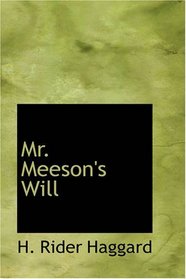This is a rather unusual story and not one that we world associate with Haggard, particularly as the few of his books that are popularly published are the Quatermain and Ayesha novels. But in this we have a story of indigence and avarice, and a principal character patterned after Dickens Scrooge, complete with near destitute nephew. So then the first half of the book somewhat mirrors A Christmas Carol, in which Meeson treats his employees, as well as the authors whom he publishes, horrendously, and disinherits his nephew. But, like Scrooge, he meets circumstances that cause him to repent and write a new will, albeit in a rather unusual format. So much for a treatment of Dickens! Now on to Dickens contemporary, Wilkie Collins. The second half of the book deals with the probate of Meesons uniquely formatted last will and testament, and is in every way equal to the standard established by Collins; in fact, absent the authors name, one might surmise that it is Collins work. This is an entertaining read for a evening or two and surely a must for any follower of Haggard.
Book Reviews of Mr. Meeson's Will
|
|
Mr Meeson's Will Author:
|




